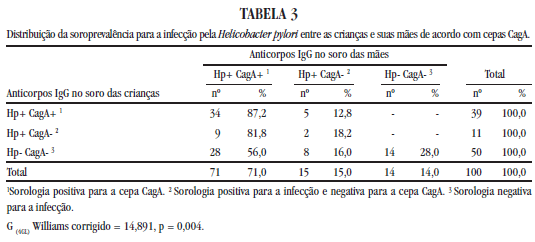The prevalence of Helicobacter pylori infection was investigated in blood samples from 100 children aged 1 to 12 years and from their mothers, by means of the indirect hemagglutination and anti-CagA methods, using ELISA assays. From these 100 children, 79 stool samples were obtained and bacterial antigens in the stools were investigated using capture ELISA. The antigens were detected in 54.4% (43/79) of the children, and serum antibodies in 43% (34/79). These methods presented similar performance, with greatest disagreement among the children aged 1 to 4 years. The seroprevalence was 50% (50/100) among the children and 86% (86/100) among the mothers. Infected mothers represented a risk factor that was 19 times greater than that of seronegative mothers, with regard to infecting their children (p < 0.05), especially the mothers with CagA+ strains (p < 0.05). Direct person-to-person contact may be a transmission method for this infection.
Helicobacter pylori; Prevalence; CagA strains; Mother-child transmission; Brazil



